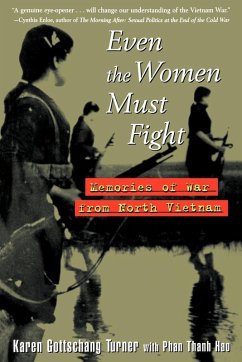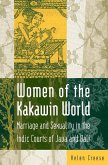Even the Women Must Fight
"Karen Turner and Phan Thanh Hao have brought scholarship and compassion to a long-neglected aspect of the Vietnam War--the contributions of Vietnamese women to the independence struggle of their nation and the terrible price they paid for their courage and patriotism."--Neil Sheehan, author of A Bright Shining Lie: John Paul Vann and America in Vietnam.
A searing chronicle of wartime experiences, Even the Women Must Fight probes the cultural legacy of North Vietnam's American War. Unflinching in its portrayal of hardship, valor, and personal sacrifice, this wrenching account is nothing short of a revelation, banishing in one bold stroke the familiar image of Vietnamese women as passive onlookers, war brides, prostitutes, or helpless refugees.
"Karen Turner has given us a book that will change our understanding of the Vietnam War--and of Vietnam today. I found it enthralling." --Cynthia Enloe, author of The Morning After:
* Sexual Politics at the End of the Cold War.
"A first-rate book that will add substantially to our understanding of the human tragedy associated with one of the most bloody conflicts in recent history."--Robert Brigham, Professor of History, Vassar College.
"Karen Turner and Phan Thanh Hao have brought scholarship and compassion to a long-neglected aspect of the Vietnam War--the contributions of Vietnamese women to the independence struggle of their nation and the terrible price they paid for their courage and patriotism."--Neil Sheehan, author of A Bright Shining Lie: John Paul Vann and America in Vietnam.
A searing chronicle of wartime experiences, Even the Women Must Fight probes the cultural legacy of North Vietnam's American War. Unflinching in its portrayal of hardship, valor, and personal sacrifice, this wrenching account is nothing short of a revelation, banishing in one bold stroke the familiar image of Vietnamese women as passive onlookers, war brides, prostitutes, or helpless refugees.
"Karen Turner has given us a book that will change our understanding of the Vietnam War--and of Vietnam today. I found it enthralling." --Cynthia Enloe, author of The Morning After:
* Sexual Politics at the End of the Cold War.
"A first-rate book that will add substantially to our understanding of the human tragedy associated with one of the most bloody conflicts in recent history."--Robert Brigham, Professor of History, Vassar College.
Dieser Download kann aus rechtlichen Gründen nur mit Rechnungsadresse in A, D ausgeliefert werden.









